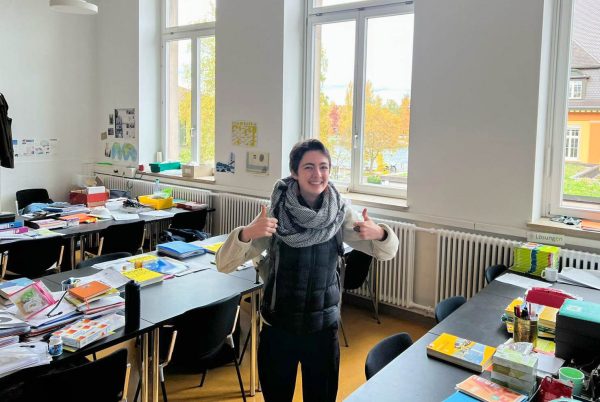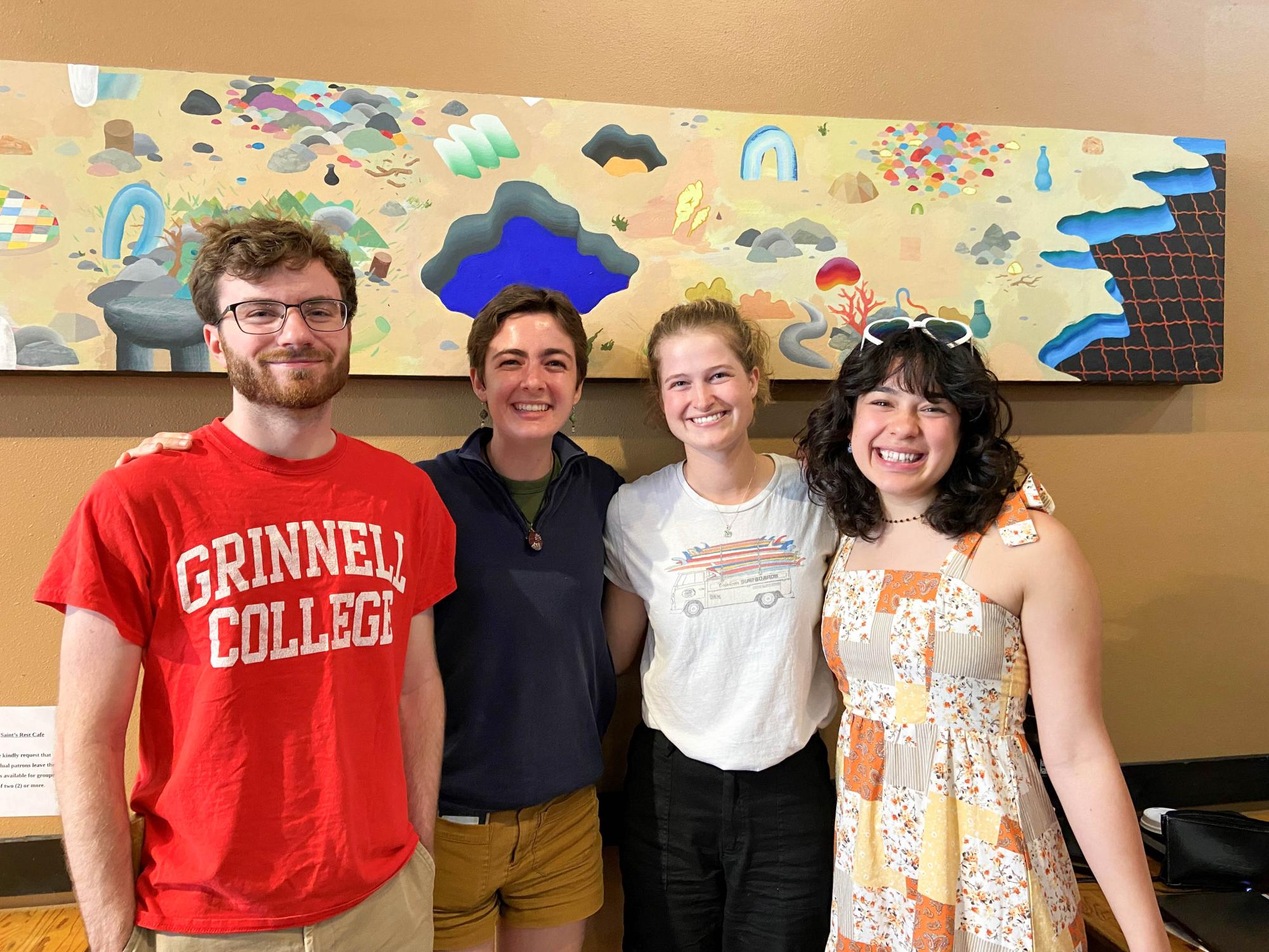When Lexi Mueldener `23 arrived in Pasto, Colombia for her Fulbright English Teaching Assistantship (ETA), many people in the city asked her, “¿Ya probaste el cuy?” — translating to, “Have you tried the guinea pig yet?” In Pasto, an Andean city near the Ecuador border, cuy is a popular delicacy. “It was actually good, it was super flavorful,” she said.
Mueldener is one of five recent Grinnell alums who received the Fulbright award for 2023-2024. Thanks to their achievement, the U.S. Department of State’s Bureau of Educational and Cultural Affairs has named Grinnell College one of the country’s top producers of Fulbright scholars.
The Fulbright U.S. Student Program, founded in 1946, is an educational exchange program that awards funds to graduating college seniors, graduate students and young professionals for a year of research or English teaching abroad. There are programs located in 160 countries, each of which have their own unique stipulations for eligibility, housing and work expectations.
When Ann Landstrom, assistant dean and director of global fellowships and awards, learned that Grinnell is one of this year’s top-producing institutions, she said she was pleased, but not surprised. Since the 2009-2010 cycle, Grinnell has received this recognition 14 times.
In order to receive the award, a university must have at least four U.S. students accepted to the Fulbright Program. For the past 4 years, Bowdoin College has topped the list, this year with 47 applications and 23 grants. During her nearly 20 years at Grinnell, Landstrom said that in a given year she receives anywhere from 13 to 30 applicants and 3 to 6 named finalists. “It’s still exciting each time, and [I’m] proud,” Landstrom said.
Besides sampling unfamiliar Colombian dishes and exploring the city, Mueldener spends much of her week at the Universidad Cooperativa de Colombia campus Pasto, teaching university students of varying abilities how to speak English. Between instructing different classes, collaborating with professors and running English conversation clubs, Mueldener said she has improved her “Spanglish.”
“I’ve practiced Spanish in the university a lot less than I thought because I’m teaching students [who are taking] their first English class ever,” said Mueldener. At Grinnell, Mueldener studied Spanish and anthropology and studied abroad in Spain during her third year, which she said has proven useful, especially when running errands or navigating the area. “Now I have little vendors for everything, like a chicken vendor, I have a fruit vendor, I have empanada vendors. It’s kind of through finding little pockets around where I live,” she said.
I’ve practiced Spanish in the university a lot less than I thought because I’m teaching students [who are taking] their first English class ever.
— Lexi Mueldener `23
Connor Arneson `23 is the only current grantee working on a research project, which he has titled “Virtual Narratives: Digital Media and Poland’s Past.” Landstrom said that with research Fulbright applications, “it’s oftentimes really helpful if you’ve maybe done some of that research in your undergrad, have some coursework behind you and have the competency to really be flushing it out.”
As a history major who studied abroad in Poland, Arneson said it felt like a no-brainer to return to Warsaw for the Fulbright. “You kind of need to have some inroads in the country already to some extent,” Arneson said.
Most Fulbright programs require scholars to find their own housing once accepted to their chosen country. Arneson had already established connections with professors at the University of Warsaw through his study abroad program, which he said helped in the application and travel process.
“It’s really having to use your moxie to navigate and to be brave to reach out to a stranger to say ‘Would you be my affiliation,’” said Landstrom.
Arneson secured a studio and Mueldener said she luckily found a single apartment by searching Facebook Marketplace. Ella Unal `23, on the other hand, said she spent the first month of the program with other Fulbright scholars in an Airbnb until she found an apartment with other roommates closer to her designated location in Konstanz, Germany. For Unal, housing “was probably the most stressful part of applying.”

At Grinnell, Unal majored in German studies with a focus on education and hopes to be a high school English teacher. But in the meantime, she is spending her weeks teaching 5th to 12th graders in the German state of Baden-Württemberg, reading by Lake Konstanz and bouldering at the local climbing gym.
Fulbright ETAs in Germany may only work 12 hours per week. “It’s the most flexible schedule I’ve ever had in my life,” said Unal. Additionally, Unal said that teachers in Germany are contracted to work 20 hours a week in the classroom with another 20 hours for lesson preparation, grading and other extraneous responsibilities. “I’ve definitely been thinking about the American productivity obsession,” she said.
Despite the relative ease of her work schedule, Unal has filled some of her spare time by tutoring Ukrainian students and volunteering as a barista at a local community center for immigrants.
Unal said, “I think it’s such an amazing program and I would recommend it to almost everyone. I would say make sure that [with] the specific country you’re applying to, you have a reason for applying and a reason to want to be there.”
It’s really having to use your moxie to navigate and to be brave to reach out to a stranger to say ‘Would you be my affiliation.’
— Ann Landstrom, assistant dean and director of global fellowships and awards
Mueldener and Arneson both agreed. “I think that anybody could be really successful at it, but I would say that it probably helps if you are a person who is pretty self-determined,” said Mueldener.
“Depending on the country that you decide to do your Fulbright in, acceptance rates actually can be relatively high,” said Arneson. “I’d encourage people [to] start the Fulbright application process not at the last minute, because then it’s actually not super difficult to apply.”
Ella Maloney `23 and Xonzy Gaddis `22 are also working as ETAs in Yilan County, Taiwan and San Andrés, Colombia, respectively. Intent to Apply forms for the 2025-2026 Fulbright Program through the College are due by the end of this May.
After working in global fellowships for over 20 years, Landstrom said she never grows tired of helping students apply and sending them off to countries around the world. After they leave Grinnell, she said, “I don’t want to intrude upon their journey because they need to be in that experience. But if they’re willing to keep communicating, and sometimes they just drop me pictures, I just love it.”













